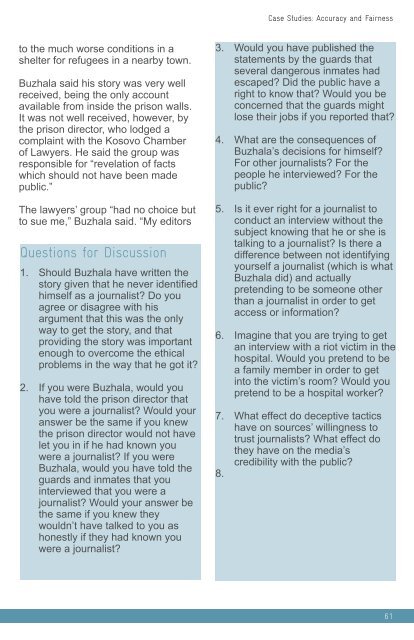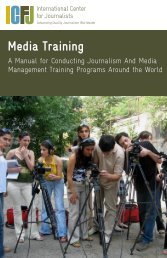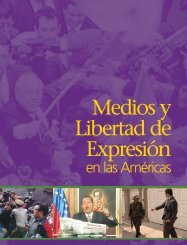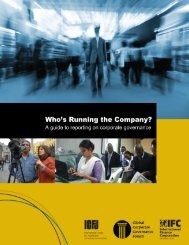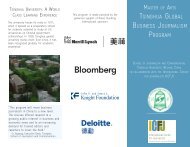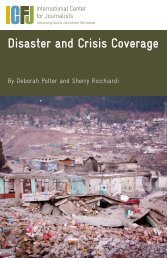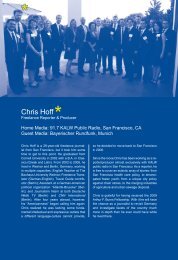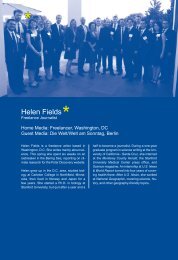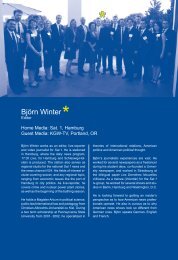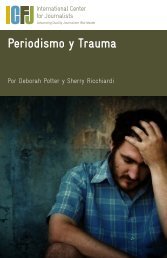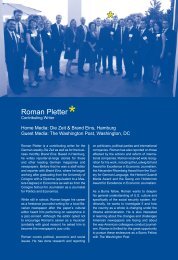Download PDF - International Center for Journalists
Download PDF - International Center for Journalists
Download PDF - International Center for Journalists
You also want an ePaper? Increase the reach of your titles
YUMPU automatically turns print PDFs into web optimized ePapers that Google loves.
Case Studies: Accuracy and Fairness<br />
to the much worse conditions in a<br />
shelter <strong>for</strong> refugees in a nearby town.<br />
Buzhala said his story was very well<br />
received, being the only account<br />
available from inside the prison walls.<br />
It was not well received, however, by<br />
the prison director, who lodged a<br />
complaint with the Kosovo Chamber<br />
of Lawyers. He said the group was<br />
responsible <strong>for</strong> “revelation of facts<br />
which should not have been made<br />
public.”<br />
The lawyers’ group “had no choice but<br />
to sue me,” Buzhala said. “My editors<br />
Questions <strong>for</strong> Discussion<br />
1. Should Buzhala have written the<br />
story given that he never identified<br />
himself as a journalist? Do you<br />
agree or disagree with his<br />
argument that this was the only<br />
way to get the story, and that<br />
providing the story was important<br />
enough to overcome the ethical<br />
problems in the way that he got it?<br />
2. If you were Buzhala, would you<br />
have told the prison director that<br />
you were a journalist? Would your<br />
answer be the same if you knew<br />
the prison director would not have<br />
let you in if he had known you<br />
were a journalist? If you were<br />
Buzhala, would you have told the<br />
guards and inmates that you<br />
interviewed that you were a<br />
journalist? Would your answer be<br />
the same if you knew they<br />
wouldn’t have talked to you as<br />
honestly if they had known you<br />
were a journalist?<br />
3. Would you have published the<br />
statements by the guards that<br />
several dangerous inmates had<br />
escaped? Did the public have a<br />
right to know that? Would you be<br />
concerned that the guards might<br />
lose their jobs if you reported that?<br />
4. What are the consequences of<br />
Buzhala’s decisions <strong>for</strong> himself?<br />
For other journalists? For the<br />
people he interviewed? For the<br />
public?<br />
5. Is it ever right <strong>for</strong> a journalist to<br />
conduct an interview without the<br />
subject knowing that he or she is<br />
talking to a journalist? Is there a<br />
difference between not identifying<br />
yourself a journalist (which is what<br />
Buzhala did) and actually<br />
pretending to be someone other<br />
than a journalist in order to get<br />
access or in<strong>for</strong>mation?<br />
6. Imagine that you are trying to get<br />
an interview with a riot victim in the<br />
hospital. Would you pretend to be<br />
a family member in order to get<br />
into the victim’s room? Would you<br />
pretend to be a hospital worker?<br />
7. What effect do deceptive tactics<br />
have on sources’ willingness to<br />
trust journalists? What effect do<br />
they have on the media’s<br />
credibility with the public?<br />
8.<br />
61


